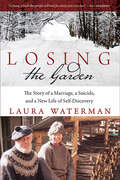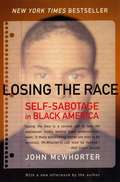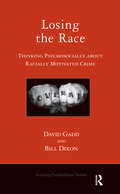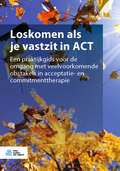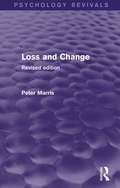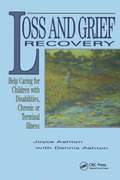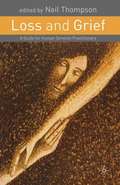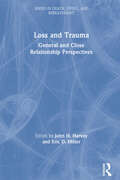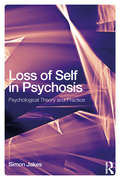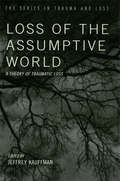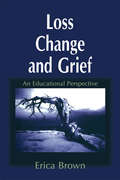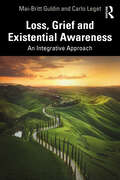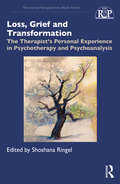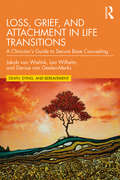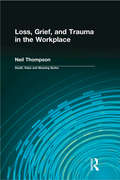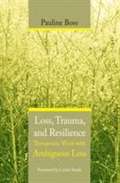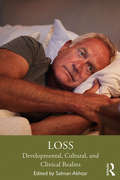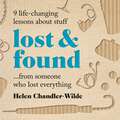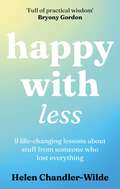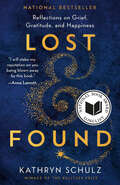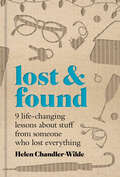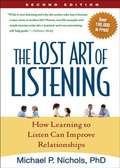- Table View
- List View
Losing the Garden: The Story of a Marriage, a Suicide, and a New Life of Self-Discovery (Excelsior Editions)
by Laura WatermanIn 1971, Laura and Guy Waterman left New York City for thirty-seven acres in Vermont, where they would live in a hand-built cabin without running water or electricity for the next thirty years. It was a life based largely in the nineteenth century, a life of hauling their own water and growing their own food, of lighting candles in the evening and heating their cabin with wood from the surrounding forest. Combined with the trail tending they did in the alpine zone of the White Mountains and the books they wrote about environmental stewardship, it made for a rewarding, healthy, and fruitful existence. But that was only part of their story. Guy's depression was another part, and his ultimate decision to take his own life on the wintry summit of Mount Lafayette—a decision he made with Laura's support—was the crux, a term climbers use to describe the hardest move on the climb. Being a climber herself, Laura had to confront the crux. This meant taking a close look at Guy's suicide and asking herself a hard question: How, or why, had she come to support the decision of the man she loved? In Losing the Garden, Laura Waterman comes to terms with her husband's long depression and the complex nature of a gifted, humorous man who was driven by obsession, self-absorption, and a strange lack of confidence. Her account of her own marriage, idyllic from the outside but riddled from within, is nonetheless a love story, a portrait of an intense and unusual marriage, and an affirmation of life after loss.
Losing the Race: Self-Sabotage in Black America
by John H. McWhorterBerkeley linguistics professor John McWhorter, born at the dawn of the post-Civil Rights era, spent years trying to make sense of this question. Now he dares to say the unsayable: racism's ugliest legacy is the disease of defeatism that has infected black America. Losing the Race explores the three main components of this cultural virus: the cults of victimology, separatism, and antiintellectualism that are making blacks their own worst enemies in the struggle for success. <p><p> More angry than Stephen Carter, more pragmatic and compassionate than Shelby Steele, more forward-looking than Stanley Crouch, McWhorter represents an original and provocative point of view. With Losing the Race, a bold new voice rises among black intellectuals.
Losing the Race: Thinking Psychosocially about Racially Motivated Crime (The\exploring Psycho-social Studies Ser.)
by David Gadd Bill DixonBased on a two-year research project funded by the Economic and Social Research Council (ESRC), this book explores why many of those involved in racially motivated crime seem to be struggling to cope with economic, cultural and emotional losses in their own lives. Drawing on in-depth biographical interviews with perpetrators of racist crimes and focus group discussions with ordinary people living in the same communities, the book explores why it is that some people, and not others, feel inclined to attack immigrants and minority ethnic groups. The relationships between ordinary racism, racial harassment and the politics of the British National Party are also explored, as are the enduring impacts of deindustrialisation, economic failure and immigration on white working class communities. The book assesses the legacy of New Labour policy on community cohesion, hate crime and respect in terms of its impact on racist attitudes and racist incidents, and explores how it is that racist attacks, including racist murders, continue to happen.
Loskomen als je vastzit in ACT: Een praktijkgids voor de omgang met veelvoorkomende obstakels in acceptatie- en commitmenttherapie
by Russ HarrisDit boek is dé onmisbare gids voor de juiste aanpak bij veelvoorkomende obstakels in acceptatie and commitmenttherapie (ACT). Loskomen als je vastzit in ACT biedt praktische strategieën met een stapsgewijze aanpak voor het overwinnen van de meest voorkomende obstakels en valkuilen van ACT. Elk hoofdstuk behandelt nieuwe methoden voor het motiveren van cliënten, het ondermijnen van moeilijk gedrag tijdens de sessies en het in gang zetten van defusie. Het overkomt alle therapeuten weleens dat ze ‘vast komen te zitten’. In dit boek onderzoekt Russ Harris het ‘vastzitten’ van zowel cliënten als therapeuten. Door middel van pragmatisme, ervaring, technieken, humor en menselijkheid reikt hij zowel de meer ervaren ACT-therapeuten als beginnelingen in ACT een aantal heldere, behulpzame lessen aan. Ook leert u hoe u cliënten in eenvoudige bewoordingen uitleg geeft over de belangrijke concepten van ACT, hoe u ook met snel afgeleide cliënten op het goede spoor blijft, en hoe u uw eigen belemmeringen bij het toepassen van ACT overwint. [aanbeveling]‘Russ Harris geniet zeer verdiend en wereldwijd de reputatie dat hij helderheid kan scheppen waar verwarring heerst en eenvoud kan brengen waar onnodige complexiteit heerst. Wanneer we ‘vastzitten’ in ons klinische werk, helpt het terugdringen van verwarring en complexiteit ons om weer een weg vooruit te gaan zien. Op bijna iedere bladzijde van dit boek is wel een wijze les te vinden. Ik heb veel geleerd van het lezen van dit boek, en als jij met ACT werkt, zal dat zeker ook voor jou gelden. Van harte aanbevolen.’ ̶ Steven C. Hayes, PhD, mede-ontwikkelaar van de acceptatie- en commitmenttherapie (ACT) Loskomen als je vastzit in ACT: een praktijkgids voor de omgang met veelvoorkomende obstakels in acceptatie- en commitmenttherapie verscheen oorspronkelijk onder de titel Getting Unstuck in ACT: a clinician’s guide to overcoming common obstacles in acceptance and commitment therapy.Russ Harris is medicus, psychotherapeut en organisatiecoach. Hij is wereldwijd bekend als trainer in acceptatie- en commitmenttherapie. Eerder schreef hij onder meer De klappen van het leven, De valstrik van het geluk en ACT in de praktijk. Harris woont en werkt in Melbourne, Australië.
Loss and Change: Revised Edition (Psychology Revivals)
by Peter MarrisFirst published in 1974, then reissued in 1986 with a long introduction by the author, which developed the analysis in the light of recent theory and related it to work done in the field since its first publication. The late Peter Marris shows how understanding grief can help us to understand processes of change, both personal and social, and to handle them with more compassion for ourselves and others. He sees grieving as the working out of a psychological reintegration, whose principles are essentially similar whether the ‘structures of meaning’ of our life fall apart from the loss of a personal relationship, of a predictable social context or of an interpretable world. Marris draws on his wide-ranging research to develop his argument. A study of widows, a description of the devastating effects of urban renewal projects on people whose familiar neighbourhoods are destroyed, an analysis of the activities of tribal associations in Nigeria, and reflections on the analogies between scientific and political revolutions are a few of the studies Marris weaves together in tracing the meaning of change and loss in human life.
Loss and Change: Revised Edition (Psychology Revivals)
by Peter MarrisFirst published in 1974, then reissued in 1986 with a long introduction by the author, which developed the analysis in the light of recent theory and related it to work done in the field since its first publication.The late Peter Marris shows how understanding grief can help us to understand processes of change, both personal and social, and to handle them with more compassion for ourselves and others. He sees grieving as the working out of a psychological reintegration, whose principles are essentially similar whether the ‘structures of meaning’ of our life fall apart from the loss of a personal relationship, of a predictable social context or of an interpretable world. Marris draws on his wide-ranging research to develop his argument. A study of widows, a description of the devastating effects of urban renewal projects on people whose familiar neighbourhoods are destroyed, an analysis of the activities of tribal associations in Nigeria, and reflections on the analogies between scientific and political revolutions are a few of the studies Marris weaves together in tracing the meaning of change and loss in human life.
Loss and Grief Recovery: Help Caring for Children with Disabilities, Chronic, or Terminal Illness
by Joyce Ashton Dennis AshtonThe grief reaction is often similar for many diverse circumstances and situations. This book focuses heavily on caring for children with disabilities, chronic or terminal illness, dealing with the loss, and the recovery process.
Loss and Grief: A Guide for Human Services Practitioners
by Neil ThompsonThis edited volume explores the wide range of practice situations across the human services in which issues loss and grief are likely to be important. It also extends understandings of loss and grief beyond death-related losses, encompassing new developments in the theoretical literature. Addressing the social and political dimensions of loss and grief as well as the psychological dimensions, this text brings together contributors from a variety of disciplines, professional background and countries, including such renowned figures as Dame Cicely Saunders and Robert A. Neimeyer.
Loss and Trauma: General and Close Relationship Perspectives (Series in Death, Dying, and Bereavement)
by John H. Harvey; Eric D. MillerGiven the relationship between trauma, loss, and interpersonal bonds, the editors have assembled a noteworthy list of contributions discussing trauma associated with close relationships (divorce, infertility, widowhood). Certainly, trauma is closely associated with loss. This edited volume offers the perspective of over twenty leading scholars in the study of trauma and loss. Each chapter offers extensive coverage of contemporary issues (terror management, rational suicide, spirituality, stigmatization). Relationship issues within these topics are also explored.
Loss of Self in Psychosis: Psychological Theory and Practice
by Simon JakesIn Loss of Self in Psychosis: Psychological Theory and Practice Simon Jakes takes a critical look at contemorary approaches to the psychology of psychosis. In doing so, he explores how these vastly different approaches, as well as our numerous conceptualisations of schizophrenia, work to reduce the effectiveness of CBT as a treatment. Four different psychological approaches to psychosis are examined in the first part of this book, as well as the development of CBT for psychosis and the theory behind this. In the second part, he describes the therapy of some clients and suggests that incorporating ideas from some of the different theories of psychosis in the same treatment may be beneficial. Using extended examples from clinical practice over the past 20 years to illuminate his theories, Loss of Self in Psychosis: Psychological Theory and Practice will prove to be thought-provoking reading for clinical psychologists, psychiatrists and other mental health professionals working with this client group.
Loss of the Assumptive World: A Theory of Traumatic Loss (Series in Trauma and Loss)
by Jeffrey KauffmanThe assumptive world concept is a psychological principle of the conservation of human reality or "culture" - it is a lens for seeing the psychological disturbances that occur in times of change. In this collection, the authors examine the assumptive world from diverse theoretical perspectives, providing the reader with an array of different viewpoints illuminating the concept and its clinical usefulness.
Loss, Change and Grief: An Educational Perspective
by Erica BrownFirst Published in 1999. Routledge is an imprint of Taylor & Francis, an informa company.
Loss, Grief and Existential Awareness: An Integrative Approach
by Carlo Leget Mai-Britt GuldinLoss, Grief and Existential Awareness introduces the Integrated Process Model (IPM), a new interdisciplinary and interprofessional model for grief research, education, and accompaniment that distinguishes and integrates five dimensions of grief: physical, emotional, cognitive, social, and spiritual.Central in this book is the insight that grief is connected to love because it is rooted in losing what is meaningful and dear to us. Once we recognize this, grief can become a window to existential awareness. Combining research on the physical, emotional, cognitive, social, and spiritual dimensions of grief, the integrated process approach connects this quest for a personal and authentic answer to the big questions in life with the philosophical and therapeutic tradition of existential thinking. Structured in an accessible, informative manner with gradual information building, the book presents the IPM approach at the beginning and then turns to it as a model throughout the book, so the reader gradually will start to deepen their understanding and memorize the framework. The structure is enhanced with boxes with existential reflections and exercises to engage the reader and case presentations of grieving persons who are followed throughout the book.This book is meant for everyone who is interested in a deeper understanding of how loss and grief can help opening the door to a more meaningful way of living. It is especially helpful for healthcare professionals, therapists, counsellors, chaplains, and researchers.
Loss, Grief and Transformation: The Therapist’s Personal Experience in Psychotherapy and Psychoanalysis (Relational Perspectives Book Series)
by Shoshana RingelThis book is a timely and relevant book for psychotherapists and psychoanalysts who process loss both in their own lives and in the lives of their patients, offering perspectives from a range of theoretical backgrounds, clinical vignettes and personal insights. This volume addresses the scope of grief and mourning between the therapeutic dyad, and carefully examines how the patient and therapist experience intersect and imbue the analytic space and the therapeutic process. The book examines personal loss of parents and partners, as well as loss generated by mass trauma through the lens of the Holocaust, the immigrant experience, the COVID-19 pandemic and the environment. There are chapters that cover how the lost other continues to live within one’s mind, and within the analytic relationship, how loss impacts one’s internal self system, and how loss associated with traumatic experience with the deceased continues to reverberate. With a unique focus on the therapist’s personal experience of loss, and how it shapes the clinical situation, as well as a broad range of perspectives on managing and working with loss in patients, this is an invaluable book for all practicing psychoanalysts and psychotherapists.
Loss, Grief, and Attachment in Life Transitions: A Clinician’s Guide to Secure Base Counseling (Series in Death, Dying, and Bereavement)
by Jakob van Wielink Leo Wilhelm Denise van Geelen-MerksLoss, Grief, and Attachment in Life Transitions gives readers an attachment-informed grief counseling framework and a new way of understanding non-death loss and its treatment. Loss and grief are viewed through a wide-angle lens with relevance to the whole of human life, including the important area of career counseling and occupational consultation. The book is founded on the key themes of the Transition Cycle: welcome and contact, attachment and bonding, intimacy and sexuality, seperation and loss, grief and meaning reconstruction. Rich in case material related to loss and change, the book provides the tools for adopting a highly personalized approach to working with clients facing a range of life transitions. This book is a highly relevant and practical volume for grief counselors and other mental health professionals looking to incorporate attachment theory into their clinical practice.
Loss, Grief, and Trauma in the Workplace (Death, Value and Meaning Series)
by Neil Thompson Dale A LundThe workplace is not immune to the problems, pressures, and challenges presented by experiences of loss and trauma and the grief reactions they produce. This clearly written, well-crafted book offers important insights and understanding to help us appreciate the difficulties involved and prepare ourselves for dealing with such demanding situations when they arise. People's experiences of loss and trauma are, of course, not left at the factory gate or the office door. Nor are loss and traumatic events absent from the workplace itself. Loss, grief, and trauma are very much a part of life - and that includes working life. Executives, managers, human resource professionals, and employee assistance staff need to have at least a basic understanding of how loss, grief, and trauma affect people in the workplace. This book provides that foundation of understanding and offers guidance on how to find out more about these vitally important workplace issues.The text provides a valuable blend of theory and practice that will be of interest to those involved in management, human resources, and organizational studies as well as those interested in the social scientific study of loss, grief, and trauma - and, of course, to those involved in the helping professions. It is essential reading for anyone concerned with making the workplace a more humane and effective environment, or anyone wishing to develop an understanding of the complexities of loss, grief, and trauma in our lives.
Loss, Trauma, and Resilience: Therapeutic Work with Ambiguous Loss
by Pauline BossPauline Boss, the principal theorist of the concept of ambiguous loss, guides clinicians in the task of building resilience in clients who face the trauma of loss without resolution. Boss describes a concrete therapeutic approach that is at once directive and open to the complex contexts in which people find meaning and discover hope in the face of ambiguous losses. In Part I readers are introduced to the concept of ambiguous loss and shown how such losses relate to concepts of the family, definitions of trauma, and capacities for resilience. In Part II Boss leads readers through the various aspects of and target points for working with those suffering ambiguous loss. From meaning to mastery, identity to ambivalence, attachment to hope-these chapters cover key states of mind for those undergoing ambiguous loss. The Epilogue addresses the therapist directly and his or her own ambiguous losses. Closing the circle of the therapeutic process, Boss shows therapists how fundamental their own experiences of loss are to their own clinical work. In Loss, Trauma, and Resilience, Boss provides the therapeutic insight and wisdom that aids mental health professionals in not "going for closure," but rather building strength and acceptance of ambiguity. What readers will find is a concrete therapeutic approach that is at once directive and open to the complex contexts in which people find meaning and discover hope in the face of ambiguous losses.
Loss: Developmental, Cultural, and Clinical Realms
by Salman AkhtarThe experience of loss is ubiquitous in human life, but its nature and impact have great variations. When loss is phase-specific, expected, and accompanied by compensatory supplies, it can lead to ego growth. When loss is untimely, unexpected, and unaccompanied by environmental 'holding,' it becomes traumatic and needs clinical attention. This edited volume brings together a distinguished cadre of international contributors in order to explain the multifaceted and nuanced nature of loss from a variety of different perspectives. These clinicians, administrators, and writers delineate the great variability in the setting, antecedents, and consequences of loss. Development-facilitating and development-impeding losses are addressed and so are the losses that seem inevitable as one moves from childhood through adolescence and young adulthood to midlife and old age. Loss experienced by institutional organizations and war-torn societies is also examined. The book’s ultimate focus is clinical: it highlights the many technical dilemmas in working with grieving patients and offers therapeutic strategies aimed at ameliorating their anguish. Loss: Developmental, Cultural, and Clinical Realms will appeal to psychoanalysts and psychotherapists both in practice and training from a variety of different backgrounds.
Lost & Found: 9 life-changing lessons about stuff from someone who lost everything
by Helen Chandler-WildeAn exploration into why we keep holding on to material things and what they mean to usOn New Year's Eve of 2018, journalist Helen Chandler-Wilde lost everything she owned in a storage unit fire in Croydon, where she'd stowed all her possessions after a big break-up. She was left devastated, and forced to re-evaluate her relationship with owning material things. A mix of memoir, self-help and journalism, Lost & Found explores the psychological reasons for why we buy and keep the things we do, and explains how we can liberate ourselves from the tyranny of 'too much'. Helen interviews people from all walks of life, including behavioural psychologists on the science of nostalgia, a nun on what it's like to own almost nothing and consumer psychologists on why we spend impulsively, to help us better understand why we're surrounded by clutter and what we can do to change it.This smart-thinking book explains the sociological quirks of human nature and the fascinating science behind why we buy and hold onto things. By the end of it, your relationship with your belongings will be changed forever.
Lost & Found: 9 life-changing lessons about stuff from someone who lost everything
by Helen Chandler-WildeAn exploration into why we keep holding on to material things and what they mean to usOn New Year's Eve of 2018, journalist Helen Chandler-Wilde lost everything she owned in a storage unit fire in Croydon, where she'd stowed all her possessions after a big break-up. She was left devastated, and forced to re-evaluate her relationship with owning material things. A mix of memoir, self-help and journalism, Lost & Found explores the psychological reasons for why we buy and keep the things we do, and explains how we can liberate ourselves from the tyranny of 'too much'. Helen interviews people from all walks of life, including behavioural psychologists on the science of nostalgia, a nun on what it's like to own almost nothing and consumer psychologists on why we spend impulsively, to help us better understand why we're surrounded by clutter and what we can do to change it.This smart-thinking book explains the sociological quirks of human nature and the fascinating science behind why we buy and hold onto things. By the end of it, your relationship with your belongings will be changed forever.
Lost & Found: A Memoir
by Kathryn SchulzAn enduring account of joy and sorrow from one of the great writers of our time, The New Yorker&’s Kathryn Schulz, winner of the Pulitzer Prize&“Our lives do indeed deserve and reward the kind of honest, gentle, brilliant scrutiny Schulz brings to bear on her own life. The book is profound and beautiful.&”—Marilynne Robinson, author of Housekeeping and GileadONE OF THE MOST ANTICIPATED BOOKS OF 2022—Oprah Daily, The Washington Post, Vogue, The Philadelphia Inquirer, Esquire, Chicago Review of Books, Town & Country, Electric Lit, The Rumpus, Lit HubEighteen months before Kathryn Schulz&’s beloved father died, she met the woman she would marry. In Lost & Found, she weaves the stories of those relationships into a brilliant exploration of how all our lives are shaped by loss and discovery—from the maddening disappearance of everyday objects to the sweeping devastations of war, pandemic, and natural disaster; from finding new planets to falling in love.Three very different American families form the heart of Lost & Found: the one that made Schulz&’s father, a charming, brilliant, absentminded Jewish refugee; the one that made her partner, an equally brilliant farmer&’s daughter and devout Christian; and the one she herself makes through marriage. But Schulz is also attentive to other, more universal kinds of conjunction: how private happiness can coexist with global catastrophe, how we get irritated with those we adore, how love and loss are themselves unavoidably inseparable. The resulting book is part memoir, part guidebook to living in a world that is simultaneously full of wonder and joy and wretchedness and suffering—a world that always demands both our gratitude and our grief.A staff writer at The New Yorker and winner of the Pulitzer Prize, Kathryn Schulz writes with curiosity, tenderness, erudition, and wit about our finite yet infinitely complicated lives. Crafted with the emotional clarity of C. S. Lewis and the intellectual force of Susan Sontag, Lost & Found is an uncommon book about common experiences.
Lost & Found: Nine life-changing lessons about stuff from someone who lost everything
by Helen Chandler-WildeWhy do we buy and keep the things we do, and how can we live a less cluttered life? Journalist Helen Chandler-Wilde dives deep to explore, explain, and guide us on the path to liberation from the tyranny of "too much."On New Year's Eve of 2018, Helen Chandler-Wilde lost everything she owned in a storage unit fire in Croydon, England, where she'd stowed all her possessions after a big breakup. She was left devastated and forced to re-evaluate her relationship with owning material things.In Lost & Found, she offers a profound mix of memoir, self-help, and journalism to explore the psychological reasons, sociological quirks of human nature, and fascinating science behind why we buy and hold onto things. Helen interviews people from all walks of life, including behavioral psychologists on the science of nostalgia, a nun on what it's like to own almost nothing, and consumer psychologists on why we spend impulsively, to help us better understand why we're surrounded by clutter and what we can do to change it.By the end of this smart-thinking book filled with lessons and engaging prompts to help us gain perspective on our buying habits and the value we place on what we already have, your relationship with your belongings will be changed forever. The perfect "new year, new you" read or gift for anyone who is downsizing, striving for a more sustainable lifestyle, or is eager to cultivate a minimalist mindset.
Lost Art of Listening, Second Edition
by Michael NicholsOne person talks; the other listens. It's so basic that we take it for granted. Unfortunately, most of us think of ourselves as better listeners than we actually are. Why do we so often fail to connect when speaking with family members, romantic partners, colleagues, or friends? How do emotional reactions get in the way of real communication? This thoughtful, witty, and empathic book has already helped over 100,000 readers break through conflicts and transform their personal and professional relationships. Experienced therapist Mike Nichols provides vivid examples, easy-to-learn techniques, and practical exercises for becoming a better listener--and making yourself heard and understood, even in difficult situations.
Lost Art of Listening, Second Edition
by Michael P. NicholsOne person talks; the other listens. It's so basic that we take it for granted. Unfortunately, most of us think of ourselves as better listeners than we actually are. Why do we so often fail to connect when speaking with family members, romantic partners, colleagues, or friends? How do emotional reactions get in the way of real communication? This thoughtful, witty, and empathic book has already helped over 100,000 readers break through conflicts and transform their personal and professional relationships. Experienced therapist Mike Nichols provides vivid examples, easy-to-learn techniques, and practical exercises for becoming a better listener--and making yourself heard and understood, even in difficult situations.
Lost Art of Listening, Second Edition
by Michael P. NicholsOne person talks; the other listens. It's so basic that we take it for granted. Unfortunately, most of us think of ourselves as better listeners than we actually are. Why do we so often fail to connect when speaking with family members, romantic partners, colleagues, or friends? How do emotional reactions get in the way of real communication? This thoughtful, witty, and empathic book has already helped over 100,000 readers break through conflicts and transform their personal and professional relationships. Experienced therapist Mike Nichols provides vivid examples, easy-to-learn techniques, and practical exercises for becoming a better listener--and making yourself heard and understood, even in difficult situations.
